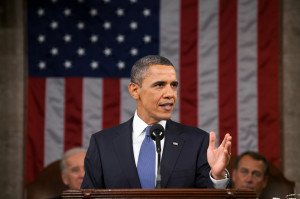What China’s Response to the State of the Union says about US-China Relations
 On January 20th, United States President Barack Obama gave his annual State of the Union speech before Congress. In addition to domestic issues, Obama, following tradition, also mentioned certain foreign policy issues that have surfaced in the last year. Although the United States’ influence worldwide is waning as more and more countries fight for a more important seat in today’s globalized economy, the U. S. still maintains a high level of political power. Thus, when President Obama explicitly referenced China three times in his hour-long the speech, he opened himself up to intense scrutiny by Chinese commentators. Indeed, when he declared that the United States, rather than China, should be writing the rules for “the world’s fastest-growing region,” in order to prevent American workers and businesses from being put at a “disadvantage,” China immediately reacted, citing America’s ambitions to “dominate the world.”
On January 20th, United States President Barack Obama gave his annual State of the Union speech before Congress. In addition to domestic issues, Obama, following tradition, also mentioned certain foreign policy issues that have surfaced in the last year. Although the United States’ influence worldwide is waning as more and more countries fight for a more important seat in today’s globalized economy, the U. S. still maintains a high level of political power. Thus, when President Obama explicitly referenced China three times in his hour-long the speech, he opened himself up to intense scrutiny by Chinese commentators. Indeed, when he declared that the United States, rather than China, should be writing the rules for “the world’s fastest-growing region,” in order to prevent American workers and businesses from being put at a “disadvantage,” China immediately reacted, citing America’s ambitions to “dominate the world.”
Although the United States and China are the two largest economies in the world, important political differences between China’s Communist regime and America’s long-held democratic one have strained relations between the two nations, as shown by Obama’s speech. Although towards the end of the 20th century China was more focused on building up its economy in the domestic sphere, in recent years the Chinese government has increasingly expanded its search for political influence abroad. To this end, the Chinese government invested billions of dollars in Africa, allegedly devaluated its currency to keep exports cheap, and most recently announced new economic initiatives aimed specifically at the Asia Pacific. These include a modern-day Silk Road, the creation of the Asia-Pacific Free Trade Agreement as an alternative to the US-led project of the Trans-Pacific Partnership, and the Asian Infrastructure Investment Bank as an alternative to the Japan-led Asian Development Bank.
Although most of the coverage of the 2015 State of the Union was limited to description of President Obama’s points, the Global Times published the main critique of Obama’s references to China, citing Chinese government officials and political analysts. The message was a clear re-affirmation of China’s desire to play a role in the Asia Pacific region while cooperating with other regional powers as well as the United States, rather than excluding any country. On the other hand, it portrayed the United States as an aggressive superpower attempting to take control of the Asia Pacific region while excluding China. By emphasizing the United States’ efforts to dominate the region and diplomatically stating that it seeks cooperation rather than confrontation with the United States, China attempts to present itself in a more appealing light to other countries.
Beyond international posturing, China and the United States’ views on economics also became apparent following the State of the Union and China’s response to it. The Diplomat called Obama’s view of trade with Asia a “zero-sum vision,” citing Obama’s words that having China write the rules of trade would be a “disadvantage” for American workers. The analysis suggests an incompatibility between a powerful China and opportunities for American workers and businesses. On the other hand, Foreign Ministry Spokesperson Hua Chunying reaffirmed China’s desire for win-win economics, once again emphasizing cooperation over exclusion as well as its search for mutual benefits in all of its economic agreements. Political analyst Zha Xiaogang backed these claims, affirming, “China is more interested in developing an economy that aims at creating mutual benefits.”
As always with the Chinese government, however, it is important to interpret the claims coming out of a Communist government in light of today’s political reality, where claims of economic and political neo-imperialism have affected both the United States and China. At face value, China’s goals of establishing a modern-day Silk Road appear to fit the government’s declared model of win-win economics, but the true nature of the project has undertones of neo-imperialism, just like China’s recent economic investments in Africa. It is fair to say that both superpowers are concerned with their own interests, but in today’s world that means trade with each other is necessary. Consequently they have adopted a dynamic of peaceful competition. Although President Obama highlighted that competition in the 2015 State of the Union, it is not likely to change relations between the two nations, but simply serves to remind the public of the nature of their alliance.
